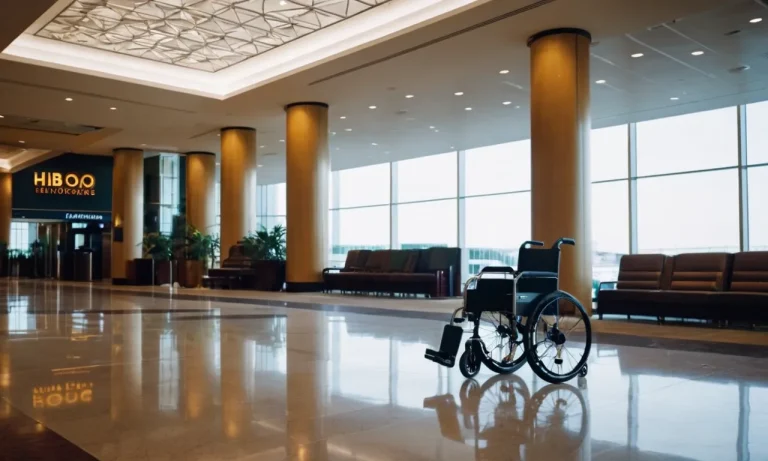How Much Is Hotel Deposit? A Comprehensive Guide
Planning a vacation or a business trip often involves booking a hotel room, and one of the most common questions that arise is: how much is the hotel deposit? This seemingly simple query can have a complex answer, as hotel deposit amounts can vary widely depending on various factors.
If you’re short on time, here’s a quick answer to your question: Hotel deposits typically range from a one-night room charge to the full cost of your entire stay, depending on the hotel’s policies and the length of your reservation.
In this comprehensive guide, we’ll delve into the intricacies of hotel deposits, exploring the factors that influence the amount, the different types of deposits, and the best practices for navigating this aspect of your travel planning.
Whether you’re a seasoned traveler or a first-time hotel guest, this article will equip you with the knowledge you need to make informed decisions and avoid any unpleasant surprises.
Factors Influencing Hotel Deposit Amounts
When booking a hotel stay, one of the important considerations is the deposit amount required. This upfront payment serves as a guarantee for the hotel and can vary significantly based on several factors.
Understanding these factors can help you budget effectively and avoid any unpleasant surprises during your stay.
Length of Stay
The duration of your planned visit plays a crucial role in determining the deposit amount. Generally, the longer your stay, the higher the deposit required by the hotel. For instance, a one-night stay might only require a deposit equal to the first night’s rate, while a week-long vacation could demand a deposit covering multiple nights or even the entire stay.
This policy helps hotels mitigate the risk of last-minute cancellations or no-shows for extended bookings.
Hotel Policies
Each hotel has its own unique policies when it comes to deposits. Some hotels may require a fixed percentage of the total stay cost as a deposit, while others might have a flat rate for all bookings. Luxury hotels or resorts often demand higher deposits compared to budget accommodations.
It’s essential to review the hotel’s deposit policy before making a reservation to avoid any surprises. Reputable travel websites like Expedia and Booking.com typically provide this information upfront.
Room Type and Rate
The type of room you book and its corresponding rate can also influence the deposit amount. Higher-end suites or premium room categories generally require larger deposits than standard rooms. Additionally, if you’ve secured a discounted rate or package deal, the deposit might be adjusted accordingly.
It’s always a good idea to inquire about the deposit specifics when booking a room at a special rate.
Peak vs. Off-Peak Seasons
Hotels often adjust their deposit policies based on peak and off-peak seasons. During high demand periods, such as holidays, festivals, or popular travel seasons, hotels may require higher deposits to secure reservations and protect against potential losses from cancellations or no-shows.
Conversely, during off-peak times, when occupancy rates are lower, hotels might offer more flexible deposit policies to attract guests.
Here’s a quick comparison of deposit amounts for different scenarios:
| Scenario | Typical Deposit Amount |
|---|---|
| One-night stay at a budget hotel | One night’s rate |
| Week-long stay at a luxury resort (peak season) | 50% of the total stay cost |
| Three-night stay at a mid-range hotel (off-peak) | First night’s rate |
Remember, these are just general guidelines, and actual deposit amounts can vary based on the specific hotel’s policies and your booking details. It’s always wise to carefully review the deposit requirements before finalizing your reservation to avoid any surprises and ensure a smooth and enjoyable stay.
😊
Types of Hotel Deposits
Refundable vs. Non-Refundable Deposits
One of the most common types of hotel deposits is the refundable deposit. As the name suggests, this deposit is fully refundable if you cancel your reservation within the hotel’s specified cancellation policy.
Hotels typically require a refundable deposit equal to one night’s stay or a percentage of the total cost. This deposit serves as a guarantee that you’ll show up for your reservation, and the hotel will refund it upon check-in or cancellation within the allotted time frame. 😊
On the other hand, non-refundable deposits are exactly what they sound like – you won’t get your money back if you cancel your reservation. Hotels often offer lower rates for non-refundable deposits, making them a popular choice for travelers who are certain about their plans.
According to Hotel News Resource, non-refundable deposits can save you up to 20% on your hotel stay. However, it’s important to read the fine print carefully, as some hotels may charge additional fees or penalties for cancellations or no-shows.
Partial Deposits
Partial deposits are another common option, particularly for longer stays or more expensive accommodations. With a partial deposit, you’ll pay a percentage of the total cost upfront, typically ranging from 10% to 50%.
This deposit secures your reservation, and you’ll pay the remaining balance upon check-in or by a specified date before your arrival. Partial deposits can be refundable or non-refundable, depending on the hotel’s policies. 🤔
Full Prepayment
Some hotels require full prepayment for your entire stay at the time of booking. This option is more common for vacation rentals, boutique hotels, or during peak travel seasons. By paying the full amount upfront, you’ll often get a discounted rate or other perks, such as free breakfast or late check-out.
However, prepayment is usually non-refundable, so it’s crucial to be certain about your travel plans before committing. According to Statista, the global prepayment rate for hotel rooms was around 20% in 2020, reflecting the industry’s shift towards more flexible booking options.
No matter which type of deposit you choose, it’s always a good idea to read the hotel’s cancellation policy carefully and understand the terms and conditions. By being an informed traveler, you can make the best decision for your budget and travel needs while enjoying a hassle-free and amazing hotel experience!
👏
Best Practices for Managing Hotel Deposits
Read the Fine Print
Before booking a hotel, it’s crucial to thoroughly read and understand the fine print regarding deposits. Hotel policies can vary significantly, and overlooking the details can lead to unexpected charges or complications.
Make sure you comprehend the deposit amount required, when it will be charged, and under what circumstances it may be refundable or non-refundable. According to a study by Expedia, nearly 20% of travelers have encountered issues with hotel deposits due to a lack of understanding of the policies.
Understand Cancellation Policies
Closely related to deposits are cancellation policies. Hotels often have strict rules regarding cancellations, and failing to adhere to them can result in forfeiting your deposit or incurring additional fees.
Familiarize yourself with the cancellation deadlines, and be aware of any penalties for late cancellations or no-shows. Some hotels may offer more flexible cancellation policies for a higher rate or through a refundable deposit.
According to TripAdvisor, 63% of travelers consider cancellation policies when choosing a hotel.
Consider Travel Insurance
Travel insurance can provide valuable protection against unforeseen circumstances that may jeopardize your hotel booking or deposit. Many comprehensive travel insurance policies cover scenarios such as trip cancellations, delays, or interruptions, which could help you recoup your deposit or non-refundable costs.
Look for reputable travel insurance providers like Travel Guard or Allianz Travel Insurance, and carefully review the coverage details to ensure it aligns with your specific needs.
Did you know? According to a survey by InsureMyTrip, nearly 30% of travelers have had to cancel or interrupt their trips due to unforeseen circumstances, emphasizing the importance of travel insurance.
Use Reputable Booking Channels
When booking a hotel, it’s advisable to use reputable and trusted booking channels, such as well-known online travel agencies (OTAs) like Booking.com, Hotels.com, or Expedia. These platforms often have clear policies and procedures in place for managing deposits, cancellations, and refunds.
Additionally, they may offer additional protection or guarantees for your bookings. According to a report by Phocuswright, OTAs account for over 50% of online hotel bookings, highlighting their popularity and reliability.
Remember, managing hotel deposits effectively can save you from unnecessary hassles and financial losses. Stay informed, plan ahead, and enjoy your travels with peace of mind! 😊
Special Considerations for Different Travel Scenarios
Business Travel
When it comes to business travel, hotel deposits can vary significantly depending on the company’s policies and the specific arrangements made with the hotel. Many corporations have negotiated corporate rates and contracts with major hotel chains, which may include special terms for deposits and cancellations.
These arrangements are designed to streamline the booking process and provide cost-effective solutions for frequent business travelers.
According to a survey by Business Travel News, nearly 60% of companies require their employees to use a corporate travel booking tool or agency for hotel reservations. These tools often include pre-negotiated rates and deposit policies, ensuring that employees comply with company guidelines and receive the best possible rates.
Additionally, some companies may provide corporate credit cards or direct billing arrangements, eliminating the need for individual deposits altogether.
Group Bookings
When it comes to group bookings, such as for weddings, conferences, or family reunions, hotels may require a larger deposit or even full payment upfront. This is to ensure that the hotel can accommodate the group and secure the necessary resources, such as meeting rooms or event spaces.
The deposit amount can vary greatly depending on the size of the group, the duration of the stay, and the hotel’s policies.
According to Hotel News Resource, the average deposit for group bookings ranges from 10% to 25% of the total estimated cost. However, some hotels may require a higher deposit, especially during peak seasons or for larger groups.
It’s crucial to carefully review the contract and understand the deposit requirements, cancellation policies, and any additional fees that may apply.
International Travel
When traveling internationally, hotel deposits can become a bit more complex due to currency exchange rates and varying local regulations. Many hotels in popular tourist destinations may require a deposit in the local currency, which can be challenging for travelers unfamiliar with the exchange rates or payment methods.
According to a report by Expedia, one of the largest online travel agencies, international hotel deposits can range from 10% to 30% of the total stay cost. Additionally, some hotels may require a refundable security deposit to cover any incidental charges or damages during the stay.
It’s essential to research the local customs and regulations, as well as consult with your travel agent or the hotel directly to ensure a smooth and hassle-free experience. Don’t be afraid to ask questions and clarify any uncertainties regarding deposits or payment methods before booking your international accommodation.
Conclusion
Understanding hotel deposit requirements is crucial for a smooth and stress-free travel experience. By familiarizing yourself with the factors that influence deposit amounts, the different types of deposits, and the best practices for managing them, you can make informed decisions and avoid any unpleasant surprises.
Remember, hotel deposits are not one-size-fits-all, and it’s essential to carefully review the policies of your chosen accommodation before making a reservation. By being proactive and informed, you can ensure that your hotel stay is not only comfortable but also financially manageable.
Whether you’re planning a weekend getaway or an extended vacation, this comprehensive guide on hotel deposits will equip you with the knowledge you need to navigate this aspect of travel planning with confidence. Happy travels!








